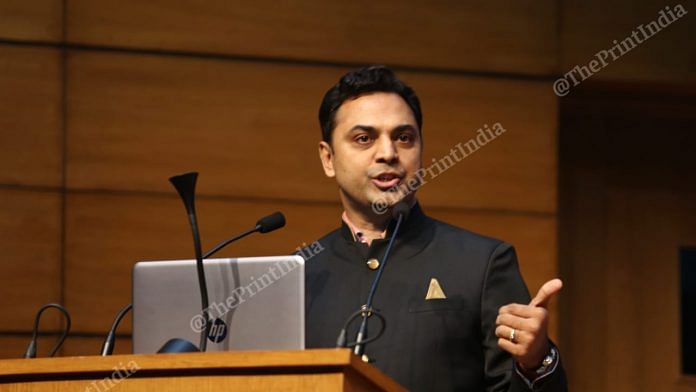New Delhi: The Narendra Modi government is working on a fiscal package and is closely studying the impact of Covid-19 on various industries, Chief Economic Advisor Krishnamurthy Subramanian said Wednesday at the digital version of ThePrint’s Off the Cuff.
The CEA said lower inflationary pressures in 2020-21 mean India can consider a one-time monetisation of fiscal deficit.
In a conversation with ThePrint’s Editor-in-Chief Shekhar Gupta, Subramanian said the government is conducting a detailed sectoral analysis on the impact of Covid-19 and an announcement should be made soon.
“We have looked at what has been the impact sector by sector and the macroeconomic impact. We have done a comprehensive analysis of the sectors that are impacted and based on that the package is being worked on,” he said.
Asked when the fiscal stimulus package will be announced, Subramanian said, “The exact details of when it will come… it is above my paygrade to speculate on this. There has been work that is going on. We should hear from the government soon.”
He added that the government has been burning the midnight oil given the scale of the crisis, and is closely tracking the financial sector and the non-banking finance companies that were under stress even prior to the Covid-19 situation.
The finance ministry is looking to design a package that takes into account the fiscal constraints faced by the central government while addressing the problems faced by many sectors including service sectors and MSMEs.
Also read: Govt package a relief measure, tax-break stimulus ideal to fight Covid: RBI panel member
Monetisation of deficit
With tax revenues expected to contract at a time expenditure is increasing, the Modi government is also faced with a potential sharp increase in fiscal deficit. This has led to many economists suggesting that the Indian central bank should print more money to monetise the deficit – a practice that India hasn’t followed for many years.
On the possibility of monetisation of the deficit, Krishnamurthy Subramanian said one has to recognise that there is “no free lunch”.
“If you monetise the deficit, there may be a cost in terms of inflation. However, inflation worries are lower this year. Oil prices are declining. Global demand is going to be tepid this year, so oil prices may continue to be low. Food prices have also come down. Covid will have an impact on consumption and on a whole, inflationary worries are lower,” he said.
However, he added, “It can be considered but one has to be clear that this is an exceptional circumstance.”
Also read: Economists expect RBI will print money as India battles Covid-19. Here’s what it means
Indian economy’s growth
CEA Krishnamurthy Subramanian did not provide any growth estimates for the Indian economy for 2020-21 and said the impact on tax revenues in the first quarter could be 1 per cent of GDP based on many assumptions.
“There is a lot of uncertainty in predicting any growth numbers. If we are able to open up some sectors on 20 April and if cases do not increase dramatically, then the impact on the economy may not be as bad,” he said.
Many international financial institutions and brokerages have forecast India to grow between 0-2 per cent in 2020-21.
Also read: Agriculture, manufacturing units will drive GDP but more relief needed, say industry bodies
On universal income
Krishnamurthy Subramanian also said that providing a universal basic income (UBI) may not be possible in India without a removal of subsidies and urged the need for a political debate.
He pointed out that his predecessor Arvind Subramanian, who had written about UBI in an economic survey authored by him, had envisaged the policy as a replacement of subsidies.
“It is a substitute to existing subsidies and not an add-on,” said the CEA, adding that providing UBI without removal of subsidies is fiscally not possible.
Subramanian, a proponent of nudge economics, also pointed out how Covid-19 brings to light the public good of sanitation including washing hands. He also spoke about how episodes like Covid-19 create a fear of being alone and cause a “salience bias”. He said this is where measures like lighting of lamps help.
The CEA added that India reforms well in a crisis and the time is ripe to implement some of the reforms.
Also read: IMF sees growth in Asia Pacific coming to a standstill for the first time in 60 years




